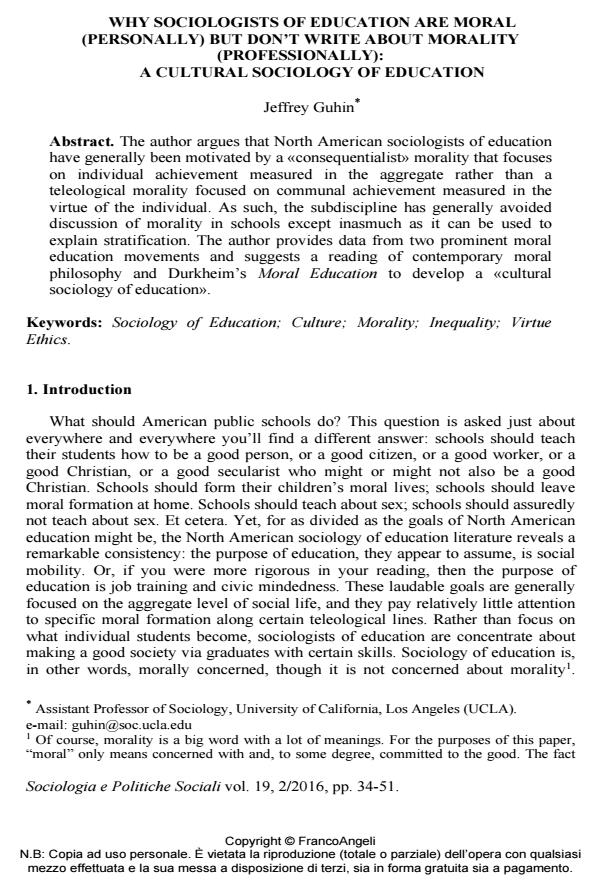Why sociologists of education are moral (personally) but don’t write about morality (professionally): a cultural sociology of education
Titolo Rivista SOCIOLOGIA E POLITICHE SOCIALI
Autori/Curatori Jeffrey Guhin
Anno di pubblicazione 2016 Fascicolo 2016/2
Lingua Inglese Numero pagine 18 P. 34-51 Dimensione file 222 KB
DOI 10.3280/SP2016-002003
Il DOI è il codice a barre della proprietà intellettuale: per saperne di più
clicca qui
Qui sotto puoi vedere in anteprima la prima pagina di questo articolo.
Se questo articolo ti interessa, lo puoi acquistare (e scaricare in formato pdf) seguendo le facili indicazioni per acquistare il download credit. Acquista Download Credits per scaricare questo Articolo in formato PDF

FrancoAngeli è membro della Publishers International Linking Association, Inc (PILA)associazione indipendente e non profit per facilitare (attraverso i servizi tecnologici implementati da CrossRef.org) l’accesso degli studiosi ai contenuti digitali nelle pubblicazioni professionali e scientifiche
The author argues that North American sociologists of education have generally been motivated by a «consequentialist» morality that focuses on individual achievement measured in the aggregate rather than a teleological morality focused on communal achievement measured in the virtue of the individual. As such, the subdiscipline has generally avoided discussion of morality in schools except inasmuch as it can be used to explain stratification. The author provides data from two prominent moral education movements and suggests a reading of contemporary moral philosophy and Durkheim’s Moral Education to develop a «cultural sociology of education».
Parole chiave:Sociology of Education; Culture; Morality; Inequality; Virtue Ethics.
- What Makes a Quality College? Reexamining the Equalizing Potential of Higher Education in the United States Christina Ciocca Eller, in American Journal of Sociology /2023 pp.637
DOI: 10.1086/727891 - Dramatic Intellectuals Celso M. Villegas, pp.283 (ISBN:978-3-031-89908-9)
- Academic Orientation as a Function of Moral Fit: The Role of Individualizing Morality Kerby Goff, Eric Silver, Inga Dora Sigfusdottir, in Sociology of Education /2022 pp.153
DOI: 10.1177/00380407211072428 - Handbook of Classical Sociological Theory Jeffrey Guhin, pp.381 (ISBN:978-3-030-78204-7)
Jeffrey Guhin, Why sociologists of education are moral (personally) but don’t write about morality (professionally): a cultural sociology of education in "SOCIOLOGIA E POLITICHE SOCIALI" 2/2016, pp 34-51, DOI: 10.3280/SP2016-002003